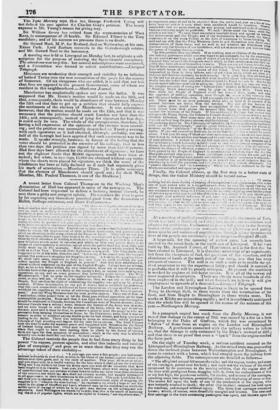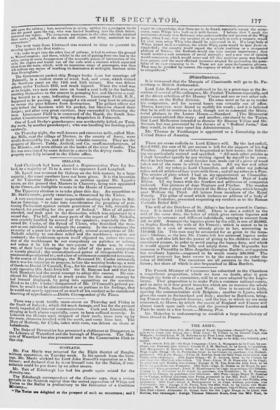In a paragraph copied last week from the Derby Mercury,
it was stated that damage to the extent of 7001. was caused by a fire on a farm belonging to the Duke of Grafton, which fire was occasioned by " flakes " of flame from an engine on the London and Birmingham Railway. A gentleman connected with the railway writes to inform us, that the damage is only estimated by the Duke's steward at 2201.; and that there is no proof that even a " spark" from the engine reached the farm.yard. On the night of Tuesday week, a serious accident occured on the Liverpool and Birmingham Railway. As the mixed train was proceeding down time inclined plane between Wolverhampton and Birmingham, at came in contact with a horse, which had strayed upon the railway from the adjoining fields. The consequences are detailed as follows-
" The affrighted animal fell across the rails ; and the engine, tender, and many of the carriages, passed over his body ; and such was the violence of the shock occasioned by its resistance to the moving vehicles, that the engine shot of the lines witlt prodigious force, dragging with it, down the embankment of five or six feet high, the ponderous vehicle, the tender, and several of the carriages, smashing some into splinters, prostrating others, and displacing all more or less. The tender fell upon the body of one of the conductors of the engine, who was instantly crushed to death ; the other (his brother) retained his hold upon the machine, and escaped without injury. The three first carriages continued horses; which, of course, were dreadfully mangled and bruised. The next and first carriage in the train containing passengers was upset, sad thrown upon its side upon the railway ; hut, marvellous to relate, neither the passengers inside nor the guard upon the top, who was hurled headlong into the ditch below, sustained any injury. The numerous passengers in the other vehicles retained their sears; and, beyond the shock and alarm, and delay, sustained no in-
convenience."
The next train from Liverpool was warned in time to prevent its running against the first train-
,' In order to get into the other line of railway, it had to retrace the ground to Wolverhampton ; and there, whilst in the act of passing from one line to the paw, owing to some derangement of the moveable points of intersection of the rails, the engine and tender ran off the rails with a violence which separated them from the train, which, with its numerous cargo of passengers, was thus left without any means of reaching its destination at midnight, fourteen miles from Birmingham." The Government packet. ship Ranger broke Atm her moorings off Falmouth, in a violent storm of wind, hail, and snow, which visited the Southern coast on the 14th and 15th instant. She was driven ashore, under Trefusis Hill, and much injured. When the wind was at its height, two men were seen on board a coal- hulk in the harbour, exerting themselves to the utmost in pumping her, and likewise a coal. bag hoisted to a spar, indicating distress, Lieutenant Field, R.N., happened to be passing, and engaged a six-oared long-boat to attempt to rescue the poor fellows from destruction. The gallant officer not only bribed the boatmen with his pocket, but likewise shared their danger; and after very great exertion, they succeeded in liberating the men. Lieutenant Field is in command of the Rapid, the South Aus- tralian Commissioners' brig, awaiting despatches in Falmouth.
One of Lord Derby's gamekeepers was accidentally killed, on Tues- day week, by another gamekeeper; who was handling his fowling-pie& carelessly. On Thursday night, the well-known and extensive mills, called Mor- den Mills, near the village of Merton, in the county of Sorry, were totally destroyed by fire, and all their valuable contents. They are the property of Messrs. Teddy, Attfield, and Co. snuff-manufacturers, of the Minories, and were situate on the banks of the river 1Vandle. The fire was occasioned by some defect in a stove in the drying-room. The property was fully insured in the Globe office.



























 Previous page
Previous page